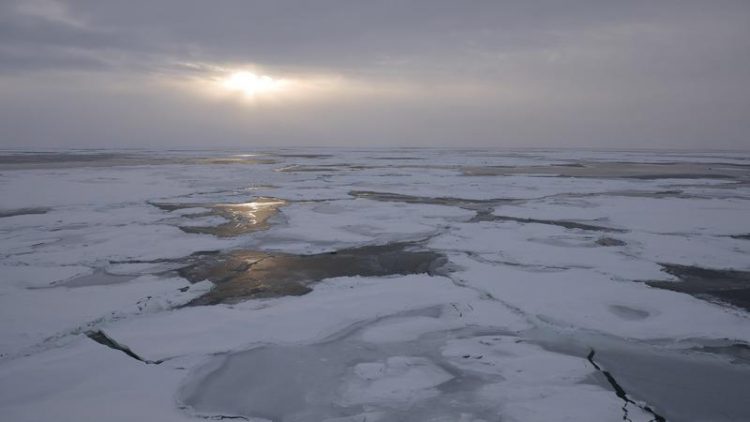Cause for variability in Arctic sea ice clarified

Arctic sea ice D. Olonscheck
“We know that the Arctic sea ice is declining more and more because we humans are warming the Earth by emitting greenhouse gases. But it has so far been unclear why in addition to this long-term decline the Arctic sea ice fluctuates so strongly from one year to the next,” says first author Dirk Olonscheck.
Previous studies assumed that self-amplifying processes, such as the increased reflectivity of bright ice compared to dark ocean water (the so-called ice-albedo feedback), are primarily responsible for the strong variability of the sea ice.
In contrast to these assumptions, the new study shows that the ice-albedo-feedback and other amplifying processes are only of minor importance for the interannual sea-ice variability.
“The main cause for the sea-ice variability are fluctuations in the amount of heat in the atmosphere transported into the Arctic, where it leads to sea ice melt. We have now been able to demonstrate that this link exists in all climate models and also in observational data,” states Dirk Olonscheck.
The results of the study imply on the one hand that the cause of interannual fluctuations in sea ice are easier to understand than previously thought, since complex atmospheric and oceanic processes within the Arctic are negligible.
On the other hand, the results also imply that it will hardly be possible to reliably predict the extent of the Arctic sea ice from one year to the next. Dirk Olonscheck:
“To do so, we would have to be able to predict the atmospheric heat transport into the Arctic, which depends on the highly chaotic weather.”
Dr Dirk Olonscheck
Max Planck Institute for Meteorology
Phone: +49 (0)40 41173 205
Email: dirk.olonscheck@mpimet.mpg.de
Prof Dr Thorsten Mauritsen
University Stockholm, Department of Meteorology
Phone: +46 (0) 8 164358
Email: Thorsten.mauritsen@misu.su.se
Dr Dirk Notz
Max Planck Institute for Meteorology
Phone: +49 (0)40 41173 163
Email: dirk.notz@mpimet.mpg.de
Olonscheck, D., T. Mauritsen and D. Notz (2019) Arctic sea-ice variability is primarily driven by atmospheric temperature fluctuations. Nature Geoscience, doi:10.1038/s41561-019-0363-1
Media Contact
More Information:
http://www.mpimet.mpg.de/All latest news from the category: Earth Sciences
Earth Sciences (also referred to as Geosciences), which deals with basic issues surrounding our planet, plays a vital role in the area of energy and raw materials supply.
Earth Sciences comprises subjects such as geology, geography, geological informatics, paleontology, mineralogy, petrography, crystallography, geophysics, geodesy, glaciology, cartography, photogrammetry, meteorology and seismology, early-warning systems, earthquake research and polar research.
Newest articles

New organoid with all key pancreas cells
Researchers from the Organoid group (previously Clevers group) at the Hubrecht Institute have developed a new organoid that mimics the human fetal pancreas, offering a clearer view of its early development….

Unlocking the potential of nickel
New study reveals how to use single atoms to turn CO2 into valuable chemical resources. Nickel and nitrogen co-doped carbon (Ni-N-C) catalysts have shown exceptional performance in converting CO2 into…

‘Spooky action’ at a very short distance
Scientists map out quantum entanglement in protons. Particles streaming from collisions offer insight into dynamic interactions and collective behavior of quarks and gluons. Scientists at the U.S. Department of Energy’s…



